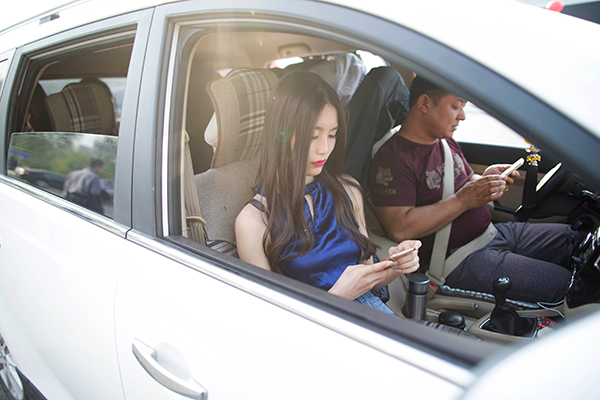 |
|
A model for an auto show in Taiyuan, Shanxi province, uses the Didi Chuxing car-hailing service to commute from her college to the auto show. [Photo/China Daily] |
Fares likely to rise as the two operators will not need to pay out heavy subsidies
The top two ride-hailing companies in China are expected to soon end the costly fight over the largest such market in the world, with Didi Chuxing agreeing to acquire the China business of its rival Uber Technologies Inc.
Beijing-based Didi, the dominant ride-hailing service provider in China, said in a statement on Monday that it will buy Uber's China operation.
The deal will make the two former competitors a small shareholder of each other's business.
Users of the companies' ride-hailing apps will likely see fares rise, as the two operators will not need to resort to heavy subsidies to woo passengers, analysts said.
Uber will continue to operate independently in China. Uber Technologies and Uber China's other shareholders will receive a 20 percent economic stake in the combined company as part of the deal, according to Didi.
Didi founder Cheng Wei and Uber Chief Executive Officer Travis Kalanick will join each other's boards.
Cheng said: "Didi Chuxing and Uber have learned a great deal from each other over the past two years. The cooperation with Uber will see the entire mobile transportation industry in China enter a new phase of a healthier and more sustainable development."
The move came after the central government legalized ride-hailing services, dispelling regulatory uncertainties over the further expansion of Didi and Uber in China.
Wang Xiaofeng, an analyst at Forrester Research Inc, said the main reason behind the merger is to cut costs in the battle between the companies for leadership of China's fast-growing ride-hailing market.
"It is only natural that passengers will find decreasing subsidies when hailing rides via the apps," she said.
Uber has spent at least $1 billion a year to gain ground in China, while Didi has been offering its own subsidies to drivers and riders to build its business.
Wang Siyuan, a white-collar worker in Shanghai, said she enjoys using Uber due to the convenience and good fares brought by competition. "If the fare rise is not too much after the merger, I will certainly keep using the apps," she said.
Turning foes into families has many precedents in China's fiercely competitive internet market. Didi Chuxing emerged from a merger between the top two players Didi and Kuaidi on Valentine's Day last year.
Zhang Xu, an Analysys International analyst, said the merger will mean that smaller players in China's internet-enabled chauffeur service market will soon feel the pinch.
"The combined market share of Didi and Uber in China's chauffeur service is more than 80 percent. Their dominant position will bring more competition to smaller players and force them to improve the quality of service to gain user loyalty," he said.
Yao Weiqun, vice-president of the Shanghai WTO Affairs Consultation Center, said that as Didi and Uber China hold dominant positions in the domestic ride-hailing market, the authorities will have to determine whether the merger breaks antimonopoly regulations.
"Compared with other ride-hailing companies, the tie-up of Didi and Uber will bring even more pressure to China's traditional taxi industry," he said.
Uber, which entered China about two years ago, makes more than 150 million trips a month. Didi said that its platform handles 16 million orders a day.
Zhong Nan contributed to this story.
